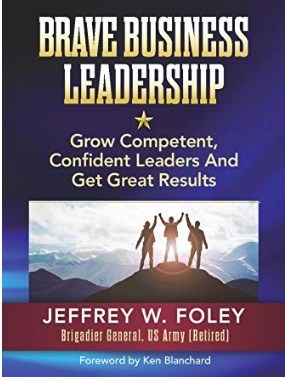AUGUSTA, Ga., Oct. 8, 2019 /PRNewswire/ — One-on-one coaching like the US Army uses to train officers can make a real difference in building competent, confident business leaders capable of leading high-performing teams, says a retired US Army general.
“Formal, regularly scheduled one-on-one check-ins are critical to long-term leader development,” says Brigadier General Jeffrey W. Foley, US Army (retired), author of the book BRAVE Business Leadership: Grow Competent, Confident Leaders and Get Great Results (2019, www.indiebooksintl.com).

“My book is not intended to imply endorsement from the United States Army: the lessons are based on what I learned as a proud member of the greatest army in the world,” says Foley.
Foley graduated from West Point in 1978 and retired from the US Army as a brigadier general after 32 years of service. Today he runs a leadership development company called Loral Mountain Solutions, based in Augusta, Ga. As a speaker, he conducts presentations to companies and professional organizations around the country on how to build competent, confident business leaders.
“Like the army, business leaders need to create a standard approach to how you conduct their periodic coaching sessions, tailored to meet the needs of their people,” says Foley. “Be clear on your agenda regarding what needs to be discussed and how you plan to execute. Be consistent in your execution. Practice the same approach so you get comfortable with it. Prepare. Find ways to seek the truth. Focus on achieving results.”
Foley says your approach to coaching different groups of people will be fundamentally the same in that you want to cause them to think. The vastly different experience levels of your people, however, will require some tailoring of your approach to best meet the individuals’ needs.
“Value coaching excellence” is one of five elements of Foley’s BRAVE methodology to grow competent, confident leaders. And according to Foley, it is the most important element.
“Scheduling these sessions adds predictability and discipline,” says Foley. “When a rhythm is established, people begin to anticipate and better prepare for the sessions. Coaching sessions in an office setting offer the environment where a comprehensive review of goals and strategies can take place. Some goals may be best assessed through a periodic monthly or quarterly feedback process. Others, like leadership behavior changes, will likely need a more rigorous, consistent feedback process to achieve real change.
According to his book, Foley advises the following general sequence of tasks to include in your periodic coaching sessions:
First, establish or review the individual’s goals. Ensure they are/remain aligned with the vision, mission, and priority objectives of the organization.
Second, discuss what is going well. Seek the individual’s response to what is going well before you offer your assessment. Acknowledge and celebrate successes. Often, I have simply asked for three items here.
Third, discuss the challenges or areas for improvement. Seek the individual’s response to what is not going well before you offer your assessment. Where do both the coach and the individual agree on challenges? What are the disagreements? Underwrite honest mistakes in the pursuit of excellence so people can learn. Learn the rationale for any shortfall in the individual’s ability or desire to achieve the goal. Collaborate to develop a focused action plan that addresses how to overcome shortfalls.
Fourth, seek suggestions for how you, the coach, can be a more effective leader for the person being coached. Doing so will enhance trust in you and help build confidence in the individual’s own capabilities.
Foley also co-authored Rules & Tools for Leaders (4th edition, 2013), a down- to-earth, practical guide for leaders. He is a contributing author to a collection of essays in the book Servant Leadership in Action (edited by Ken Blanchard and Renee Broadwell, 2018).
In addition, Foley is a certified Marshall Goldsmith Stakeholder Centered Coach, a channel partner with the Ken Blanchard Companies, a partner with the Wiley Corporation (Five Behaviors of a Cohesive Team, Everything DiSC), and a Certified Master One Page Business Plan Consultant with Jim Horan’s One Page Business Plan.
About Indie Books International
Indie Books International (www.indiebooksintl.com) was founded in 2014 in Oceanside, California by two best-selling business authors. Since then the company has released more than 125 titles. Similar to indie film companies and indie music labels, the mission of Indie Books International is to serve as an independent publishing alternative for business thought leaders.
Media Contact
Henry DeVries
[email protected]
619-540-3031
SOURCE Indie Books International
